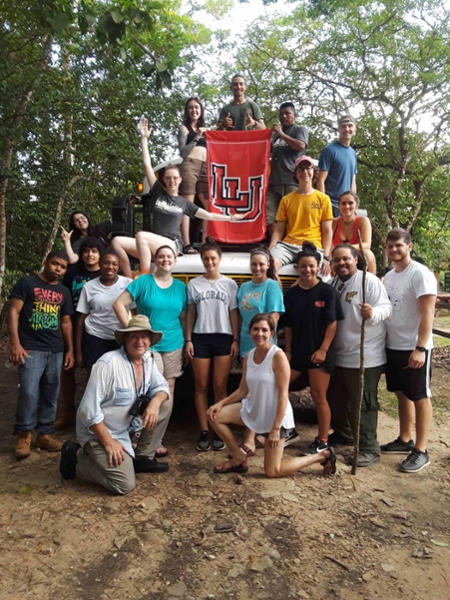Biology Majors Study Abroad in Belize
Students became researchers this summer in Belize. Dr. Matthew Hoch, LU associate professor of biology, led an annual study abroad trip to the Central American country, where students conducted research and experienced the Caribbean culture. 
During the 15-day adventure, students took two courses, “Tropical Watershed Ecology” and “Tropical Marine Biology.” For eight days, the students explored the Maya Mountain pine ridge, rainforest and savanna researching the watershed biomes. The remainder of the trip was spent snorkeling the Mesoamerican coral reef system, the world’s second largest reef system, off the coast of Belize.
“The course is structured around following the flow of water from the mountain ridges to the reef and everything in between,” said Hoch, who has been visiting the country since 1997.
Before leaving the United States, students were required to take a May-mini semester course to learn about the wildlife and biomes they would study once abroad.
Brody McBee, senior biology major, said the preparation prior to the trip enhanced his appreciation of his time in Belize. “I am glad we lectured so much because when we went out into the field we had a more complete understanding of what we were looking at. We could appreciate it much more by having some knowledge about it beforehand,” McBee said.
For the first time, the annual trip included a geology perspective. Carla Tucker, an LU adjunct geology professor joined the trip to assist Hoch but also to teach students the relationship between biology and geology.
“They are intimately related,” she said. “While we were in the Mayan mountains we were able to discuss the intruding granitic pluton and how the difference in soils brought about a change in vegetation. When we visited Glover’s Reef, I taught the students about the faults, which uplifted and tilted the sea floor allowing the Mesoamerican reef system to form.”
During the journey the students collected data in the field for immediate study but also to compare it to previous years’ collected information.
“We take some time to have some focused research days,” Hoch said. “We do a study in a lagoon system call Cox Lagoon. This was the third time we have done a study there, so over time we are building a data set. We study the vegetation, the birds and how the water quality effects the plankton. We set up an entire lab using our action packs.
The group spent two nights collecting and analyzing samples in a lab. At the coral reef, the students conducted a seagrass study. “We look at the bits in the seagrass to make predictions about where we would find larger fish,” said Hoch. “It is nice to get a data set where everything falls in line with your hypothesis.”
Tucker said she was impressed to see students living like true scientists. “After two weeks I was amazed students were conducting “hard science,” said Tucker.
McBee was responsible for sediment samples for the group of student scientists. “Basically, we would shove a tube into the sand and collect a layer of topsoil and mud and look at the microorganisms. This is then sent off, and we get data on what is happening in the bottom of these water systems,” said McBee.
Although McBee appreciated researching and the knowledge he gained, he noted a highlight of the adventure was observing the cultural differences and connecting with some of the people of Belize.
“I appreciated their resourcefulness,” McBee said. “Belize has an economy based off of tourism so they are forced to be resourceful. Everywhere you look people are collecting rainwater in preparation of the dry season. The don’t throw any food away, anything not used becomes compost.”
One day while fishing McBee made an unexpected connection with a local man named Mr. Jerome. Jerome apparently took pity on McBee because he wasn’t catching any fish.
“He taught me how to use my fishing gear in a way that was more appropriate for that environment,” said McBee. “He even loaned me bait and stuff without me asking for it. He went out of his way to be nice and provide me with some guidance. I was able to catch a fish and another person offered to cook it for me; it was delicious. They left the head and scales on, which I am not used to, but it was one of the best fish I have eaten in my life. They don't have a whole lot in Belize but they are nonetheless very kind and giving, even to strangers like me. There is a lot that we can do for others without expecting much in return. It was something I will always remember.”


